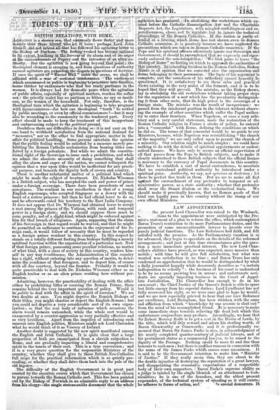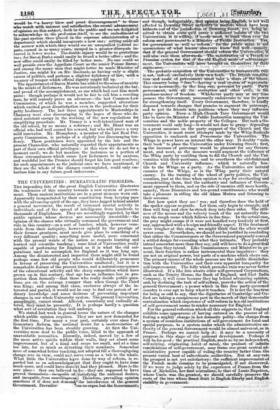LAW APPOINTMENTS.
the present Lord Chancellor was raised to the Woolsack,
scions to the appointment were anticipated by the Pre- miers statement of a plan to reform the office, which contemplated Baron Truro's restriction to its more Parliamentary duties, and the promotion of some unexceptionable lawyer to preside over its purely judicial functions. The Law Reformers had faith, and felt satisfied with the promise. As the Parliamentary vacation is so far advanced, they begin to speculate on the details of the reformed arrangements ; and just at this time circumstances give the ques- tion a more immediate practical interest. The new Lord Chan- cellor's abilities have proved, as was expected, more massive than mobile ; with time he will give full satisfaction, but what was wanted was satisfaction in no time ; and Baron Truro has only confirmed an apprehension that he would be distinguished by what a daily journalist happily while decorously describes as "a certain indisposition to celerity " : the business of his court is understood to be by no means growing less in arrear ; and unfortunate acci- dents are specially impeding business in the Court of Appel- late Jurisdiction. The Chancellor has enough to do in his own court ; the Chief Justice of the Queen's Bench is able to spare but little energy from his especial duties ; Lord Lyndhurst has not fully recovered his sight, as we were once glad to hope he would ; and we are now especially grieved to hear that our Law Reformer par excellence, Lord Brougham, has been stricken with the same sad affliction from which "knowledge by o avenue is shut out" from the mind of his accomplished filen . t is necessary to make some immediate steps towards relieving e dead lock which this
unfortunate conjuncture may produce. ordingly, we hear that Sir Robert Monsey Rolfe is to get a seat in the House of Lords, by the title, which will fitly reward and adorn his sterling worth, of Baron Glenworthy or Cranworth ; and it is professionally ru- moured that Baron Sir James Parke is 'also, in acknowledgment of
his nearly completed quarter-cent of judicial labours, and of his preeminent status as a eommerci lawyer, to be raised to the dignity of the Peerage. Nothing c uld be more fit and due than honours to such men but there is an her rumour in connexion with the name of Sir James Parke whi causes some uneasiness. It is said to be the Government irate tion to make him "Minister of Justice." If they really mean this, they are about to do the double injustice of destroying, the reputation of a great lawyer, and disappointing the reasonable expectations of a respectable body of their own supporters. f Baron Parke's supreme ability as a judge is tainted by the single blemish of an attachment to tech- nicalities; he is one of the founders, and the ablest present expounder, of the technical system of pleading as it still exists ; he adheres to forms of action, and 'is special demurrers. It would be " a heavy blow and great discouragement-'2 who watch with interest and satisfaction the recent adisticement of opinion on this-subject, both in the public and we-are delighted to acknowledge in. the profession itself, to see the embodimentof the past,syeteim; thus.pUeed: in the supreme administration of,sit department which should inaugurate a now one; setting asidiallt the sorrow with.whichthey would see an unequalled judicial re= pate, earned in. so-many years, merged in a greater-disrepute in curred in fewer weeks. The doable injury would be so gratuitous, too; for Baron Parke eould easily be found a better.offiee ; and the new office could easily be filled by better men.. No one could 'se well preside over:the Appellate Court as the senior Puisne Baroni and among the many- men that might better be made Miniater, of Justice, one might' fix on Mr. Roebuck, as having • only -a slight excess of polities, and perhaps a slighter deficiency of law, with it vacancy of temper which official dignity might fill up.
The appointment of Baron Martin has added to thesense of anxiety in the minds of Reformers. He was notoriously technical at the bar, and proud of the accomplishment, as one which had cost liim much pains : though perhaps it would not be fair to call him a receding man, he will scarcely prove an advancer—the last Common-Law Commission, of which he was a member, suggested alterations which excited great dissatisfaction even in the profession for their petty hesitancy. The last three appointments to Masterships in Chancery were also discouraging to the hopes of those who de- sired assistant energy in the working of the new regulations for simplifying procedure. Mr. Tinney is a well-intentioned man of the old school, by no means a reformer ; and Mr. Blunt was an official who had well earned his reward, but who will prove a very mild innovator. Mr. Humphrey, a member of the last Real Pro- perty Commission, is perhaps of a slightly less discouraging ten- dency. These gentlemen were appointed by the late and the present Chancellor, who naturally regarded their appointments as part of their own official privileges : at this view we do not for a moment cavil; we do but mention the instances as a portion of • those circumstances which cause Law Reformers to be anxious, and watchful lest the Premier should forget his late good resolves ; for such appointments as the judicial ones we have mentioned, if they are the whole of the changes contemplated, could only em- barrass him in any future good endeavours.



























 Previous page
Previous page